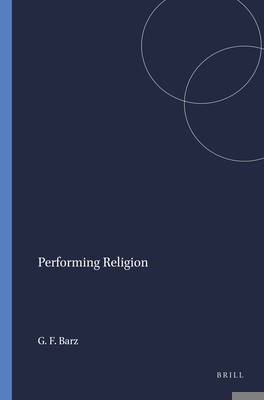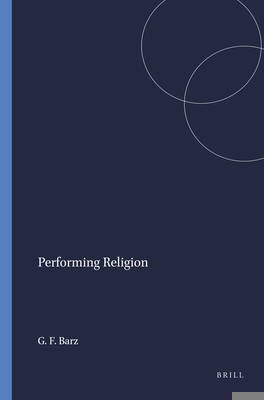
- Retrait en 2 heures
- Assortiment impressionnant
- Paiement sécurisé
- Toujours un magasin près de chez vous
- Retrait gratuit dans votre magasin Club
- 7.000.0000 titres dans notre catalogue
- Payer en toute sécurité
- Toujours un magasin près de chez vous
183,45 €
+ 366 points
Description
Performing Religion considers issues related to Tanzanian kwayas [KiSwahili, "choirs"], musical communities most often affiliated with Christian churches, and the music they make, known as nyimbo za kwaya [choir songs] or muziki wa kwaya [choir music]. The analytical approach adopted in this text focusing on the communities of kwaya is one frequently used in the fields of ethnomusicology, religious studies, culture studies, and philosophy for understanding diversified social processes-consciousness. By invoking consciousness an attempt is made to represent the ways seemingly disparate traditions coexist, thrive, and continue within contemporary kwaya performance.
An East African kwaya is a community that gathers several times each week to define its spirituality musically. Members of kwayas come together to sing, to pray, to support individual members in times of need, and to both learn and pass along new and inherited faith traditions. Kwayas negotiate between multiple musical traditions or just as often they reject an inherited musical system while others may continue to engage musical repertoires from both Europe and Africa. Contemporary kwayas comfortably coexist in the urban musical soundscape of coastal Dar es Salaam along with jazz dance bands, taarab ensembles, ngoma performance groups, Hindi film music, rap, reggae, and the constant influx of recorded American and European popular musics.
This ethnography calls into question terms frequently used to draw tight boundaries around the study of the arts in African expressive religious cultures. Such divisions of the arts present well-defended boundaries and borders that are not sufficient for understanding the change, adaptation, preservation, and integration that occur within a Tanzanian kwaya. Boundaries break down within the everyday performance of East African kwayas, such as Kwaya ya Upendo ["The Love Choir"] in Dar es Salaam, as repertoires, traditions, histories, and cultures interact within a performance of social identity.
An East African kwaya is a community that gathers several times each week to define its spirituality musically. Members of kwayas come together to sing, to pray, to support individual members in times of need, and to both learn and pass along new and inherited faith traditions. Kwayas negotiate between multiple musical traditions or just as often they reject an inherited musical system while others may continue to engage musical repertoires from both Europe and Africa. Contemporary kwayas comfortably coexist in the urban musical soundscape of coastal Dar es Salaam along with jazz dance bands, taarab ensembles, ngoma performance groups, Hindi film music, rap, reggae, and the constant influx of recorded American and European popular musics.
This ethnography calls into question terms frequently used to draw tight boundaries around the study of the arts in African expressive religious cultures. Such divisions of the arts present well-defended boundaries and borders that are not sufficient for understanding the change, adaptation, preservation, and integration that occur within a Tanzanian kwaya. Boundaries break down within the everyday performance of East African kwayas, such as Kwaya ya Upendo ["The Love Choir"] in Dar es Salaam, as repertoires, traditions, histories, and cultures interact within a performance of social identity.
Spécifications
Parties prenantes
- Auteur(s) :
- Editeur:
Contenu
- Nombre de pages :
- 244
- Langue:
- Anglais
- Collection :
- Tome:
- n° 42
Caractéristiques
- EAN:
- 9789042008274
- Date de parution :
- 01-01-03
- Format:
- Livre relié
- Format numérique:
- Genaaid
- Dimensions :
- 155 mm x 235 mm
- Poids :
- 675 g

Seulement chez Librairie Club
+ 366 points sur votre carte client de Librairie Club
Les avis
Nous publions uniquement les avis qui respectent les conditions requises. Consultez nos conditions pour les avis.







